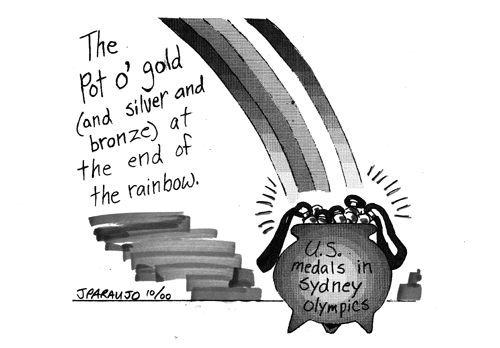Opinionated
Express voices in tasteful manner
Last Thursday, the Food and Drug Administration approved the abortion pill mifepristone, or RU-486. The two-drug regimen, which will be available to the public in about a month, causes a woman’s uterus to shed its lining, dislodging the embryo and inducing contractions that expel the embryo.
Approval of the pill has added fuel to the abortion debate.
With few restrictions placed on the drug — a doctor must only be able to date the pregnancy and provide surgical intervention if anything should go wrong — foes of RU-486 fear the pill will make abortions more common and may be abused as another form of birth control.
Advocates say the pill is a safer, more attainable alternative to more dangerous abortion techniques and cite research that shows the number of abortions to have decreased in France since the inception of RU-486 in 1988.
The debate has sparked some very different and, in some cases, extreme reactions.
Two days after the approval of the pill, an impassioned Roman Catholic priest in Illinois was accused of slamming his car into an abortion clinic and hacking the building with an ax.
In Fort Worth last Sunday, a handful of children stood in the streets
holding signs saying, “Don’t kill us.”
Since 1982, the ATF has recorded 169 arsons and/or bombings of abortion
clinics. The numbers will probably continue to rise as doctors around
the nation begin distributing this easy-to-use, non-surgical abortion
pill.
However, as pro-life and pro-choice advocates continue to wrangle over the moral, physical and emotional implications of this pill, they should remember that reasonable, non-violent and tasteful debate should never be tossed aside to voice an opinion.
Sunday, over 1,000 protesters peacefully gathered for a rally in Illinois
to contest the pill.
And that is how it should be.

in your words
letters to the editor
“Girls” reference in Nesler article offensive to TCU women
I was pleased that Miranda Nesler finally addressed how easy it is to get students’ personal information from the TCU web page. However, I was troubled that the word “girls” was used throughout the article. These “girls” are, in fact, grown women and should be referred to as such. If my memory serves me right, the usage of the word “girls” instead of “women” in reference to adult females violates The Associated Press style. Quite frankly, I’m not sure how this slipped past all of the editors. I feel sure that I’m not the only woman on campus who was offended by this reference. It is unfortunate that many people were turned-off by this otherwise well-written article due to the terminology used within.
— Sarah A. Martinez,
senior advertising/public
relations major
TCU international students at Olympics deserved recognition
I found your Sept. 29 cover photo “Olympic Hopefuls?” the final slap in the face to what can be termed as no less than poor press. It seems the information regarding TCU’s real Olympians was written as a last second matter-of-fact, tucked away neatly in your “Pulse Sidelines” when truly they should be the headliners.
I find it to be extremely poor patriotism or school loyalty in that three current international students were representing their countries in the Olympics and no word passed on to your readers. Although they would not have been able to hear us cheering due to time delays and physical constraints, many people may have watched and not known three current Horned Frogs achieved something greater than any Heisman Trophy or bowl championship.
Sure it won’t put any dollars in TCU’s pocket, but representing your country in the Olympics is still the greatest achievement any athlete can attain.
Just like NBC’s coverage, the fact that these athletes weren’t
American seemed to have diminished from your interest to cover them. That’s
certainly not the Olympic spirit or TCU spirit. I have grown near weary
hearing the words “inclusiveness” and “diversity”
thrown wantonly around this campus, yet it seems we choose to be selective
and patriotic instead of using these men’s achievements as a rallying
point for our community.
Three cheers for Olympians Lindel Frater and Ricardo “Flash”
Williams of Jamaica and Kim Collins of St. Kitts — officially the
7th fastest man in the world.
— Samuel J. Rose,
junior social work major
White student outrage at affirmative action a bit hypocritical
When the topic of conversation shifts to affirmative action, I often recall conversations heard between some of TCU’s white students. These students were not only troubled but also furious at the notion that “unqualified blacks” would dare to demand preferential treatment. They wanted to know why blacks couldn’t compete like everyone else? Why should hardworking whites, like themselves, be pushed aside for second-rate, affirmative action hires?
It seemed more than a bit hypocritical of these students to rage on about preferential treatment. The students themselves were of a very average intellect and more than likely accepted into TCU largely on the basis of family connections. Moreover, their first internships will probably be arranged in a similar fashion. In short, due to a good internship and TCU degree, those white students will be well on their way to distinguished careers — careers made possible by preferential treatment.
White people in general have never thought of themselves as beneficiaries of special treatment and probably never will. Nor is it likely that either their colleagues or their superiors would be inclined to look down on them as undeserving incompetents who got ahead on the basis of unfair advantage and were keeping better-qualified people out of work. Yet that assumption is routinely made about black beneficiaries of affirmative action.
In closing, when white people stop using the “old buddy” system and “who they know” as a crutch, then there will be no need for affirmative action.
— Shawn Worthen,
senior management major